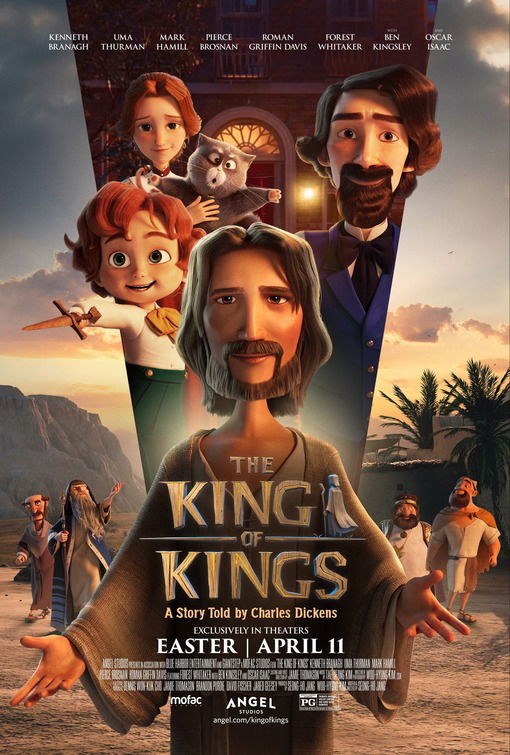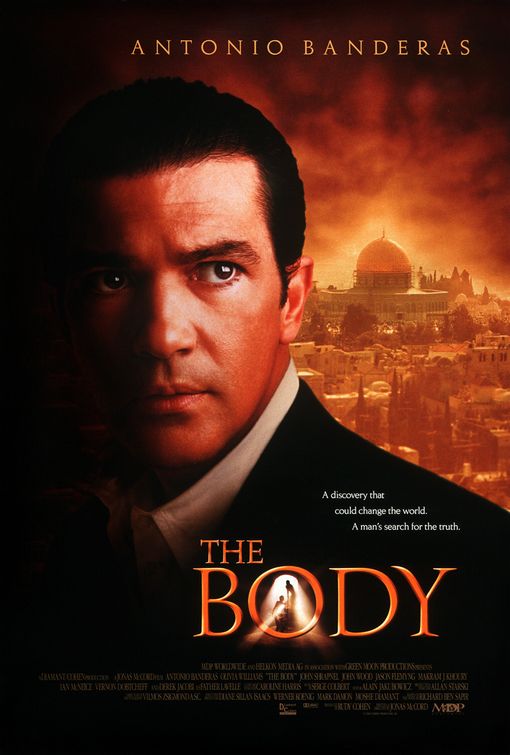“The Importance of Faith”

| None | Light | Moderate | Heavy | |
|---|---|---|---|---|
| Language | ||||
| Violence | ||||
| Sex | ||||
| Nudity |
What You Need To Know:
THE BODY ultimately affirms Christian faith in the Resurrection and Deity of Jesus Christ. It even uses an important Bible verse to do so, John 20:29, “Blessed are those who have not seen and yet have believed.” There are, however, some unbiblical elements that require caution. For instance, Father Matt’s experience confirms his belief that God has no place whatsoever in politics. His belief contradicts such Bible passages as Proverbs 28:2-4 and 29:4. Roman Catholic viewers may also be upset by the movie’s portrayal of their denomination’s leaders. There is also some violence and a few obscenities in THE BODY.
Content:
(CC, AB, PC, FR, L, VV, D, M) Christian worldview marred by anti-Roman Catholic content & a non-biblical, liberal view of the role of religion in politics & protagonist expresses brief, but vague support for Marxist liberation theology of misguided Latin American priests, plus some side characters express false religious notions; 5 obscenities including one “f” word by a humanist-thinking character & two “s” words by a Catholic priest & 0 profanities, but priest fervently says to a soldier, “In the Name of God, don’t shoot”; action violence including terrorists bomb village square as a diversion to steal an object which results in things flying around, gunfire between villains & police, small chase scene, villains kidnap children to use as extortion, a couple other explosions during gunfire, man beaten up & stoned, & man questions his faith & commits suicide; no sex, but woman lightly kisses Catholic priest’s hand & lips after injurious incident which makes him question his faith; no nudity; brief alcohol use; smoking; and, stealing, illegal stoning & manipulation.
More Detail:
Antonio Banderas stars in THE BODY as Roman Catholic priest Father Matt Gutierrez. A top Vatican cardinal assigns Father Matt to investigate the reported finding of a crucified body in a walled off section of a rich man’s tomb in Jerusalem. Israeli officials force the female archeologist who discovered the body to work with Father Matt as he investigates her findings before she can publish her paper on them. Hampering their investigation are some Jewish and Arab radicals who desperately want to find out what’s going on for political and religious reasons. Violence eventually erupts.
THE BODY goes through several twists and turns as Father Matt and the archeologist probe the artifacts in the tomb and the body. Evidence mounts that the body may indeed be that of Jesus Christ, until a final twist proves otherwise. The movie closes by quoting John 20: 29, “Blessed are those who have not seen and yet have believed.” Also, as a couple people note during the rest of the movie, the Resurrection is an important proof of the Deity of Jesus Christ. Thus, Father Matt retains his faith in the Resurrection and the Deity of Jesus Christ, a faith which, as the movie clearly points out, is essential to Christianity. As Paul firmly says in 1 Cor. 15:14, “If Christ has not been raised, our preaching is useless and so is your faith.”
Regrettably, however, there are some anti-Christian elements at the end of the movie.
First, one Catholic priest commits suicide when the evidence seems to suggest at one point that the body is in fact that of Jesus Christ. Secondly, Father Matt goes back to Rome and accuses the cardinal who sent him of manipulating the situation while risking people’s lives. He then resigns the priesthood, saying that he will now serve God in “my own way,” whatever that means. Finally, Father Matt’s experience in Jerusalem confirms his belief that God has no place whatsoever in politics. This belief is an unbiblical one that contradicts such Bible passages as Proverbs 28:2-4 and 29:4, which urge governmental rulers to maintain order justly, to follow God’s moral principles and to avoid oppressing the poor. Furthermore, Romans 13:36 says that government officials and other “authorities,” whether elected or not, are ministers and servants of God who punish and restrain wrongdoers and who commend or praise those who do good works according to the moral principles of God.
Despite these problems, THE BODY ultimately takes a positive approach to Christian faith in general. Not only does it affirm that faith with an important Bible verse at the end, it also shows how important the Resurrection of Jesus Christ’s body and the Deity of Jesus Christ is to Christians. As Thomas exclaims to the resurrected Christ just before the John 20:29 passage quoted by the movie, “My Lord and my God!”
THE BODY could have been much stronger, of course, in both its Christian worldview and its execution. It is a little contrived in spots. Some events in fact don’t quite make sense when you think about them after the movie is over. Even so, Antonio Banderas does an excellent job as Father Matt. Although Roman Catholic viewers will be upset, perhaps extremely so, that he decides to leave the priesthood at the end, his portrayal is a strongly positive one in general. Also, he is ably supported by Olivia Williams as the chain-smoking female archeologist and by Derek Jacobi as a priest with an expertise in archeology.


 - Content:
- Content: 


